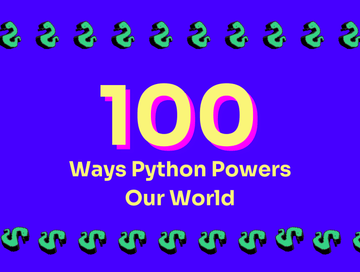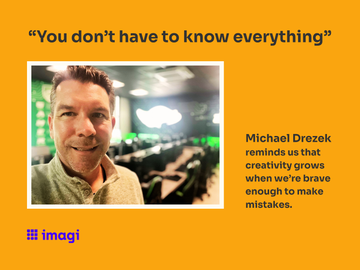
No longer just for programmers, Python plays a big role across different disciplines and careers.
Misconceptions can be tricky, and one common myth suggests that Python is only meant for those who want to build a career in tech. So if you’re asking yourself why learn Python or why teach Python to students, we're here to reveal the truth: Python is a versatile tool that has found its way into our day-to-day lives.
In 2022, Python was among the most sought after programming languages on the job market. From revolutionizing medicine and finance to enhancing art and sports, Python has proven its worth across many disciplines. It's an empowering programming language that opens doors to new possibilities and sparks creativity in unexpected ways.
Whether you're an educator seeking to inspire your students or a budding coder eager to explore new horizons, this article is your gateway to the wonderful world of Python. Together, we'll dive into an array of 100 real-life examples that showcase how learning Python can unlock a world of endless opportunities!
Digital Solutions
1. Web Development: Python code works behind the scenes and does things like showing different pages when you click on links, saving information in a database, and making websites interactive.
2. E-commerce: Python is used for building e-commerce platforms like Amazon or Shopify that handle online transactions, and update product availability.
3. Mobile App Development: Python is used to build the backend (or what goes on behind the scenes) for apps for our smartphones or tablets. Our imagi app’s backend services are developed using Python!
4. Online Forums and Communities: Python is used to create safe and friendly places on the internet where people can talk, share ideas, and help each other.
5. Computer-Aided Design (CAD): Python helps engineers create and design things on a computer, like cars or buildings, by automating some of the steps.
6. Freelancing Platforms: People use Python to build websites where they can offer their skills, find work, manage their projects, and get paid easily and automatically.
7. Document Management: Python helps keep important documents organized by sorting them, finding specific information, and making it easy to search for them.
8. Language Translation: Many programs use Python to translate languages, like turning English into Spanish or vice versa.
Creative Industries
9. Visual Art: With Python, artists can generate digital paintings and even interactive digital art installations!
10. Music and Audio Processing: Python can be used in music composition by writing special code that helps create melodies and rhythms using computers. It can make different sounds, combine them together, and even generate new musical ideas!
11. Film Production: Python can be used to create visual effects in movies during post-production editing.
12. Journalism: With the help of Python, journalists can analyze large data sets quickly and use this data to tell stories that are more understandable to readers.
13. Architecture and Design: Python is used to create computer models of buildings and structures, make 3D pictures of what they will look like, and even help design buildings more efficiently and creatively.
14. Fashion Industry: Designers can use Python to see what their idea looks like in virtual reality before sewing it in real life.
15. Digital Design: Python has found its way into the world of design, powering graphic design applications like Paint Shop Pro and Gimp. It even extends its reach to 3D animation software such as Lightwave, Blender, and Cinema 4D, showcasing its versatility and creative potential.
Game Development
16. Gaming: Python is used for game development. It helps control the game's logic, create animations, navigate characters, and much more!
17. Virtual Reality (VR) and Augmented Reality (AR): Python helps create cool 3D games and experiences that feel like you're inside a virtual world or seeing amazing things in the real world.
18. Video Game Testing: Python helps make sure video games work correctly by testing them automatically, finding problems, and keeping track of them.
Data Science & Analytics
19. Data Warehousing: Python helps organize and manage lots of data, like putting information in the right place, transforming it into a useful format, and making it easy to find and use when we need it.
20. Data Analysis: Python can be used for data analysis by writing code that helps us make sense of big chunks of information. It can do things like finding patterns and creating graphs or charts to help us understand what the data is telling us.
21. Scientific Research: As a scientist, you can use Python to run simulations, analyze data, and visualize your findings.
22. Sports Analytics: Python can be used to analyze a sports player's performance on the field or court and support coaches and players in determining strategies to improve.
23. Sentiment Analysis: Python helps understand how people feel by reading what they say, like when we write reviews or post on social media, so we can know if people are happy, sad, or excited about something.
Education and Learning
24. Education: Python is commonly used as the first programming language in schools to teach programming concepts and problem-solving skills to students through its easy-to-understand syntax.
25. Online Learning: Python is used for building e-learning platforms, content management systems, and tracking student progress.
26. Language Learning: Python can be used for developing language learning apps similar to Duolingo to generate creative language exercises and quizzes.
27. Linguistics: Python helps scientists study languages, like how words are connected, how people talk, and how computers can understand and translate different languages.
Everyday Technology
28. YouTube: Python helps run the world's favorite video-sharing website to make sure everything is working smoothly for users behind the scenes.
29. Google: Google actually uses Python to provide you with search results.
30. Instagram: This photo and video-sharing app uses Python to manage its users' profiles and photos, much like a photo album organizer.
31. Spotify: Python helps Spotify recommend songs you might like.
32. Netflix: Python helps Netflix recommend movies and shows to you. Python algorithms analyse movies you’ve watched and come up with suggestions.
33. Dropbox: Python helps Dropbox store your files and photos safely.
Natural Sciences
34. Environmental Science: Python is used to create climate models that show how our planet will change after the sea level rises.
35. Weather Forecast: Python helps meteorologists better predict the weather.
36. Oceanography: Python can be used for analyzing ocean currents, modeling marine ecosystems, and predicting weather patterns based on water temperature.
37. Chemistry: Understanding Python helps chemists process large amounts of data and solve complex problems more quickly in the lab.
38. Bioinformatics: Python is used for analyzing biological data, DNA sequencing, and building bioinformatics tools.
39. Forensic Analysis: Python helps detectives and investigators study digital evidence from fingerprints to entire crime scenes and can help with recovering lost information from devices.
40. Wildlife Conservation: Python helps scientists protect animals and their homes by tracking endangered species and finding ways to save their habitats so they can live safely.
41. Geothermal Energy: Scientists use Python to study the Earth's heat energy underground to find the best ways to use it for power.
42. Agriculture: Farmers can use special computer programs using Python that help with things like monitoring soil moisture. This helps farmers take better care of their crops, leading to healthier farms and better food for everyone.
Space Exploration
43. Space Weather Prediction: Python can help analyze solar activity to predict space weather events and protect satellite systems from breaking down.
44. NASA: They use Python to program their equipment and analyze data gathered in the cosmos.
45. Remote Sensing: Python helps scientists analyze pictures from space to learn about the Earth and how it's changing.
46. Space Debris Tracking: Python can be used for tracking space debris and predicting potential collisions with satellites, ensuring the safety of space missions and spacecraft.
Cities & Development
47. Urban Planning: Python's GeoPy module and distance calculation methods can be used to analyze the proximity of developing neighborhoods to built-out areas. This information can help city planners understand the connectivity between different areas and make informed decisions for urban development.
48. Waste Management: Python can enhance the way we process solid waste by finding ways to collect energy from waste burning and analyze data about recycling.
49. Energy Sector: Python can be used in the energy sector to create algorithms that control energy resources, such as wind turbines or solar panels, maximizing their efficiency.
50. Oil and Gas Industry: Python helps scientists and engineers analyze data from the ground to find oil and gas, improve drilling techniques, and predict how much they can get.
51. Disaster Management: With the help of Python, scientists can analyze weather data to predict when a disaster like a hurricane or an earthquake will happen.
52. Real Estate: Python can be applied to real estate to analyze the housing market information and help people find their dream homes.
Logistics and Coordination
53. Travel and Route Planning: Python helps plan the best routes for trips, and find the quickest way to get somewhere so you can have fun adventures without getting lost.
54. Tourism and Hospitality: Python can be used for hotel booking systems, travel recommendation engines, and tourist sentiment analysis.
55. Geolocation Services: Python can help you find out where you are and can give you directions on a map, like when you use a GPS.
56. Geographic Information Systems (GIS): Python is used in GIS applications for processing spatial data, mapping, and geospatial analysis.
57. Transportation: Python can analyze data from sensors, cameras, and other sources to understand road traffic patterns and help make decisions for transportation planning.
58. Food Delivery: Python can be applied to apps like Deliveroo or Uber Eats to optimize delivery routes, predict delivery times, and manage food orders.
59. Supply Chain Management: Python is used to track and organize inventory, plan the best routes for shipping, and even predict when products will be needed so that everything arrives on time.
Medical Industry
60. Healthcare: Python is used in medical research, healthcare analytics, and building healthcare-related applications.
61. Pharmaceutics: Python helps scientists find new medicines by studying how drugs interact with the body, testing different combinations, and creating computer models.
62. Mental Health: Python can be used for developing mood-tracking and mindfulness apps.
63. Chemical Engineering: Python helps scientists and engineers in making things like medicines and chemicals better by using special calculations and models.
64. Insurance: Python can be used to help insurance companies determine the likelihood of accidents happening in certain areas based on factors like past incidents and population size, which helps them determine the price of insurance policies.
65. Fitness and Health: Python can be used to create personalized workout programs, track fitness progress, and analyze health data from wearable devices.
Work Automation
66. Business Management: Python empowers tools that organizations can use to streamline their operations and meet their unique requirements, saving a lot of time for business owners.
67. Automation and Scripting: Python's simplicity and versatility make it a preferred choice for automating repetitive tasks and writing scripts, which helps tell a computer what to do.
68. System Administration: Python is used for system administration tasks like configuring servers, managing networks, and automating system tasks.
69. Quality Assurance: Python is used for automating software testing, regression testing, and building testing frameworks.
70. Event-driven Automation: Python can make computers do certain things automatically based on real-time events, like sending a notification when you receive a new message.
71. Virtual Assistants: Python is used for developing virtual assistants and chatbots like Siri or Alexa. It enables them to understand and respond to voice commands.
72. Customer Service: People use Python to create chatbots that can talk to us online and help us with questions or problems.
73. Automotive Industry: Python helps make cars smarter and safer by detecting problems and making them drive themselves.
74. Human Resources: Python can make the hiring process much faster by helping HR professionals analyze hundreds of CV’s and find the right candidates to interview for the job.
75. Legal Services: Python can be used in legal activities to make lawyers' work easier and faster. It can help analyze large amounts of legal documents, search for specific information, and even generate reports.
Advanced Technologies
76. Artificial Intelligence and Machine Learning: Python has special tools called libraries that make it easier to build intelligent computer systems. Libraries like TensorFlow, Keras, and PyTorch help us create models that can learn from data and make predictions, helping computers become smarter.
77. Natural Language Processing (NLP): Python, along with libraries like NLTK and spaCy, is used to analyze, classify, and interpret the text.
78. Image and Video Processing: Python is used in computer vision applications for image and video processing, object detection, and recognition. This technology is used in modern-day security systems.
79. Robotics: Python is used to program robots. For example, you can write a code in Python that controls the robot’s movements.
80. Internet of Things (IoT): Python is used to develop IoT applications for controlling and managing connected devices like Amazon Echo or Google Home.
81. Smart Home Assistant: With Python and the open-source project Home Assistant, you can create a personalized smart home experience. From automating lights to receiving alerts about open garage doors, Python allows you to customize and control your home effortlessly.
Marketing and Sales
82. Social Media Marketing: With Python, marketers can analyze information from platforms like Facebook or Instagram to understand what people like or talk about.
83. Digital Marketing: Python helps people who sell things online by looking at what other sellers are doing and making sure their products are seen by lots of people who might be interested in buying them.
84. Advertising: Python is used for customer segmentation, predictive analytics, and marketing automation.
85. Retail: Python can be used in retail to help stores manage their operations. It can track how many items are left in stock and remind the manager to order more items.
Financial Technology
86. Trading Decision Support: Traders can use Python to decide when to buy or sell stocks and make their own decisions based on what Python algorithms and mathematical models tell them.
87. Cryptocurrency and Blockchain: Python is used in blockchain development to manage secure transactions. This enables people to engage in safe and transparent trade activities.
88. Smart Finance Applications: Python is used to build software that helps us with money-related things, like apps that let us pay for things online, detect if someone is trying to steal our money, and manage our finances more easily. A common example is Revolut App and Vemno.
Entertainment
89. Sports Betting: Python is used for building sports betting algorithms, odds analysis, and predictive modeling.
90. Sports Broadcasting: Python helps show sports on TV by analyzing game data, updating scores in real time, and creating cool graphics and visuals.
91. Video Streaming: With Python, you can build websites and apps for streaming videos or movies, recommend what to watch next based on your preferences, and create cool special effects in movies or games.
92. Music Streaming: Python helps create apps and websites where you can listen to your favorite music, discover new songs, and make playlists of all your favorite tunes.
Security & Privacy
93. Cybersecurity: Python can be used in cybersecurity to write code that helps protect computer systems from hackers.
94. Cyber Threat Intelligence: Python is used to find and stop hackers and cyberbullies, by looking for patterns in their behavior on the internet.
95. Intellectual Property Protection: Python helps protect people's ideas and creations online by adding special marks, preventing copying, and detecting plagiarism.
96. Cryptography: Python helps keep important information safe by turning messages into secret codes, decoding them, and making sure only the right people can read them.
97. Network Analysis: Python helps make sure computer networks work well by studying how they're connected, finding problems, and making them faster and more reliable.
Government Services
98. Public Health: Python can help government agencies study and track the spread of diseases like COVID-19 by analyzing data from different sources, helping them make decisions to keep people safe and healthy.
99. Humanitarian Aid: Python is used for analyzing disaster data and managing resources in crisis situations to help people who were affected.
100. Political Campaigns: Python helps politicians understand what people want to be changed by analyzing data, predicting election results, and planning campaign strategies.
Final Notes
In conclusion, the 100 real-life examples we've explored show that Python knows no boundaries when it comes to its application in various professions. Python is not just for people who may want to pursue a career in tech. It has become a powerful tool that transcends industries, simplifying tasks and elevating the quality of work across the board.
Whether you choose to pursue a career in finance, healthcare, marketing, or any other field, understanding Python can undoubtedly help you in your professional journey. Python's versatility and practicality make it a valuable tool for streamlining processes, analyzing data, and unleashing creativity like never before.
To all the educators out there, we have great news! Imagi offers free training and tools for teachers who are eager to introduce Python into their classrooms. Embracing this opportunity will not only empower your students with a valuable skill-set but also foster their problem-solving abilities and ignite a passion for innovation. Interested in learning or teaching Python? Explore the benefits of using imagi Edu.




